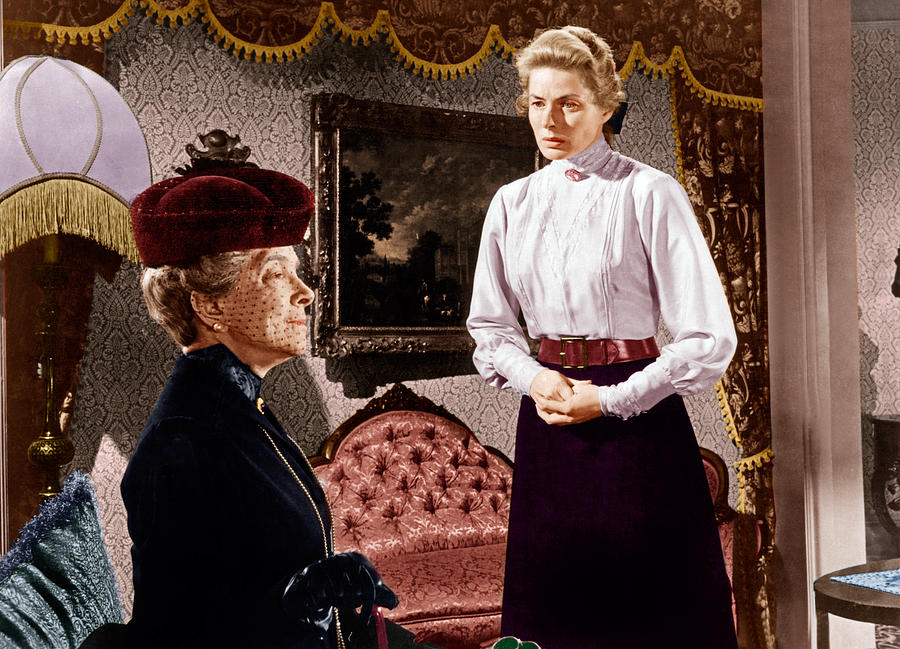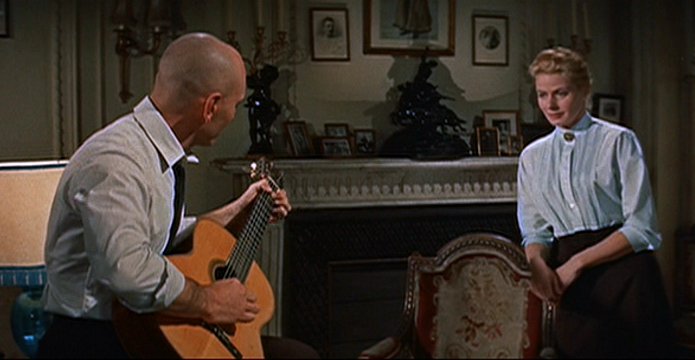It's Tuesday and you know what that means: film-talk about overlooked or forgotten movies or other A/V material as prescribed by Todd Mason our weekly host. So don't forget to check in at Sweet Freedom to see what other films and/or other interesting stuff, other bloggers are talking about today.
ANASTASIA is the 1956 Anatole Litvak film (based on a play by Marcelle Maurette) starring Yul Brynner, Ingrid Bergman and Helen Hayes. My post is an unabashed fan letter to Yul Brynner, certainly one of the most enigmatic personalities ever to grace the silver screen. Not only was he enigmatic, mysterious, cool, and incredibly elegant, he was just plain interesting to watch - when he was on screen, everyone else faded from view, even Ingrid Bergman. I don't think there's ever been another actor with the dramatic sense of screen presence that the Russian born Yul Brynner naturally possessed.
He understood his persona, the attraction of his own darkly intense good-looks and how to use them to his advantage on camera. Wearing mostly black or black and white (though in one scene in this film he wears a brown suit which, admittedly, gives him a more 'down to earth' look) he simply seethes with mysterious allure. And never has a man moved more elegantly on camera than Yul Brynner. (See other examples: THE KING AND I, THE TEN COMMANDMENTS, THE MAGNIFICENT SEVEN, etc.)
In ANASTASIA there is one famous scene where he must walk across the cinemascope screen from one open doorway on the far left to another on the far right where Ingrid Bergman's voice has been calling out to him, teasing him - she's had a bit too much to drink. Brynner is wearing black pants and a white shirt with the sleeves rolled up...sigh.
But when he enters Bergman's room, she's fallen asleep. A gorgeous and very sexy scene though nothing much has happened. It's all atmosphere. With another less elegant, less intense actor, it might not have worked as well.
ANASTASIA is the familiar story of a woman who might or might not have been the only surviving child of Czar Nicholas of Russia. When the entire Russian royal family was assassinated (crowded into a basement like shooting fish in a barrel) by Bolsheviks, in July of 1918, one of the young daughters, Grand Duchess Anastasia, was thought to have miraculously escaped and been spirited out of the country. The story persisted for years, fueled by the presence of a woman named Anna Anderson who, until her death, claimed to be Anastasia.
Though Ingrid Bergman and Helen Hayes won the awards, for me, it's Yul Brynner who commands the movie and makes more of it than it might have been otherwise. The brilliant screenplay by Arthur Laurents won as Oscar and rightly so. Though today it might seem a bit too talky, more of a 'play' than a movie, I think it works perfectly. It condenses some rather complicated themes and events into one completely understandable whole.
The story is set among a small society of Russian exiles living in France, bemoaning their loss of status, relishing their memories. In the midst of these refugees forced to flee Russia after the revolution, we meet the cynical and utterly pragmatic nightclub owner Sergei Bounine (Yul Brynner) who, with his associates Boris Chernov (the always wonderful Akim Tamiroff) and Piotr Petrovin (Sacha Pitoeff) has formed a 'corporation' with shares sold among their fellow group of exiles.
The purpose of it all is to find the 'real' Anastasia and through her, access the woman's inheritance, millions which sit unused in an English bank, the money then to be divided among the share-holders. To that end, Bounine has tried and rejected several potential 'Anastasias. When he saves poor, tormented Anna (Bergman) from jumping into the river, he thinks he's found the goods.
I am not a big fan of the Ingrid Bergman school of acting. I find her too housefrau, too mannered, to careful, too conscious of what she's doing. She's also, I think, too old for the part but that's a minor point. The story takes place ten years after the horror in that Russian basement, so Anastasia, still suffering from the effects of years in a madhouse, not to mention a train explosion, not to mention possibly being shot by assassins who wiped out her entire family might be excused for not looking young and sprightly.
Bounine and his cohorts have a week to turn Anna into the Grand Duchess Anastasia and convince the more influential members of their Russian community headed by the Dowager Empress Maria Feodorovna (the oh so wonderful Helen Hayes) who refuses to see what she considers just another self-serving imposter.
The Duchess's elderly lady in waiting played by the gloriously ditzy Martita Hunt has the hots for Bounine and tries to smooth things along as best she can.
Despite my Bergman reservations, the poignant scene in which the Duchess finally meets Anna for the first time is magnificently played by two experienced actresses in command of their craft.
The enigmatic ending is more than satisfying and when seen for the first time, comes as a welcome surprise. An intelligent way to end a story which combines fact and romantic fancy.
....sigh!












Hello Yvette:
ReplyDeleteAlthough we have not actually seen this film, it is a story which has always captured our interest. We should perhaps seek it out.
This is one of my favourite movies. I've watched it countless times. The scene when Bounine plays the guitar is very moving. I also think the score is very evocative, especially the opening scenes of Russian Easter & that spine tingling choral singing.
ReplyDeleteJane and Lance, you definitely should look for this film. I think you'd enjoy it.
ReplyDeleteLyn, I agree. I could have gone on and on about the film but I had to stop somewhere. It really is topnotch in so many ways. I love the scene of Bounine playing the guitar and singing in the nightclub too. What a man. :)
ReplyDeleteGosh - it's ages since I last saw 'Anastasia'! Yul Brynner, effortlessly full of sex-appeal - no wonder Livenbaum (Hunt) lusted after him, to which the Dowager Empress (Hayes) would retort: ' Livenbaum, you are sex mad!'
ReplyDeleteI will have to look out for the film - might even be on Netflix!
Thanks for stirring the memories, Yvette! ;-)
Sue, it is on Netflix streaming. That's where I watched it and will be watching it again. :)
ReplyDeleteGreat movie Yvette. I haven't seen this for eons!
ReplyDeletePS: Add another star to your Blog of the Year Award for 2012. I'm sending it at you in the post I'm getting ready to do.
Dear Yvett,
ReplyDeleteI used to live near Charlottesville, Virginia, and had friends who knew Anna Anderson. (I believe that she married a professor who specialized, appropriately, in Romanov history.)
As you may know, DNA results proved that Anna was not Anastasia. But the remains of Nicholas II, Alexandra and their children were authenticated by matching to their closest genetic relative, Prince Philip, the Duke of Edinburgh.
Sorry, I meant to type Yvette, of course!
ReplyDeleteI love this film, anything with Ingrid Bergman. Helen Hayes was great too. That was such an interesting story, They say she died some where in the Carolina's broke.
ReplyDeleteyvonne
Yvette,
ReplyDeleteA great film. I agree--Hayes and Bergman were excellent, but Yul Brynner made the film a great one, as he did in _The King and I_ and _The Magnificent Seven.
Thanks, Bev. It's very nice to be appreciated. :)
ReplyDeleteYeah, great movie. I wondered why I hadn't re-watched it in years...
Mark, I answer to all sorts of names. Ha.
ReplyDeleteI knew that the remains had been discovered. Such a sad episode. Such a cowardly event. I've never understood why the British Royals who were directly related to the Czar and his family didn't help them. I'll never believe they couldn't have done something.
At any rate, I was disappointed to discover that Anna Anderson was not Anastasia. What a story. It would have been a very good ending if she'd been Anastasia.
Yvonne, there were always all sorts of rumors going around. I wonder if she really believed she was Anastasia.
ReplyDeleteWe agree, Fred. The role of Bounine was made for him. I can't imagine anyone else in the role.
ReplyDeleteI've just realized that in the same year as ANASTASIA, 1956, Brynner won the the very well deserved Oscar for THE KING AND I.
Yvette,
ReplyDeleteI didn't know that--the same year?
What a choice to have to make!
Brynner competing against himself.
I think I might have voted for _Anastasia_, but. . .
Yeah, Fred, I think it was all in the same year. It was an embarrassment of riches for Brynner.
ReplyDeleteThe sexiest thing I ever saw on the screen was Yul Brynner putting his arm around Deborah Kerr's waist in The King and I. He's just really hot, and made every movie he was ever in more interesting. Westworld comes to mind, too. Good post.
ReplyDeleteThanks, Amy. I totally agree with you. That is one of the sexiest moments in movie history.
ReplyDeleteSwoon-worthy. :)
Posing as royalty of former royalty is certainly a reality and a good plot device in mystery books and movies.
ReplyDeleteDidn't a woman pose as Nero Wolfe's daughter in one book? Was it Over My Dead Body?
I don't think I was crazy about the plot line here when I saw this film years ago, but I love Ingrid Bergman in every film she's ever been in.
Hello Yvette:
ReplyDeleteGreat post. Was wondering if I could propose a brain teaser question for you concerning the score to this classic film by Alfred Newman. In the final scene the dowager Empress (Helen Hayes) is asked by her cousin, Prince Paul what she will tell the guests who have assembled to see Anastasia (Ingrid Bergman) who has fled with Gen. Bounin (Yul Brynner). The dowager replies, "I will tell them, the play is over - go home!"
There is a piece of music written by Newman underscoring this sequence that is NOT contained on the original album or any of the subsequent re-issues. I am interested in knowing two things - first: what is the name of this piece of music, and second, is there anyway I can get my hands on a copy of it for a class I am conducting on the importance of music and film.
I bought the CD believing the orchestral arrangement would be included. Regrettably, this has not been the case. Any info you could provide would be appreciated. Thank you.
1956 was an embarrassment of riches for Yul Brynner. Not only was he in ANASTANIA and THE KING AND I, but also in the Cecil B. DeMille potboiler THE TEN COMMANDMENTS.
ReplyDeleteIt's a shame that on the "20th Century Fox Studioi Classics" DVD issue of ANASTASIA in the United States, the sound is messed up, particularly in the first half of the film. Frequently the music or sound effects are so loud that it's impossible to hear to voices. I hope that when Fox eventually releases a Blu-ray edition (which is way overdue), they will have fixed the sound balance.
Welcome to the blog, BB. Thanks for dropping by. Too bad about the DVD. Maybe they'll fix it next time around. I don't own it, so I wasn't aware of the problem.
DeleteYes, 1956 was a banner year for Brynner. In truth, he was the best thing in THE TEN COMMANDMENTS.